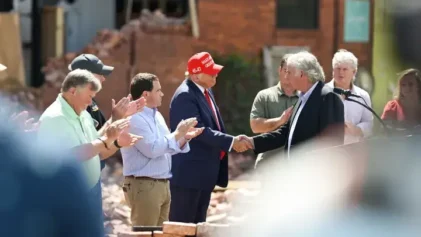In the wake of Charlottesville, President Donald Trump lobbed a provocative proposition: When it comes to our nation’s slaveholding legacy, should monuments to Founding Father slaveholders also be toppled, along with displays honoring Confederate leaders? Since we’re removing Confederate statues, Trump said in essence, are memorials to slaveholders George Washington and Thomas Jefferson next? Should we raze them, too?
Marcus Mills, a Black senior systems analyst living in suburban Washington, D.C., said Trump was advancing a red herring aimed at his followers. “I do think that Washington and Jefferson have a lot to atone for,” said Mills, who spends his Saturdays working as a docent at the Smithsonian National Museum of African American History and Culture, in the nation’s capital. “It’s been a tool of this administration to bring up false equivalencies. Whereas Jefferson and Washington were both slave owners, they also fought to create the United States. You can’t compare that to individuals who fought to separate the country with their treasonous behavior. “I think he [Trump] is talking directly to his base, as a way to release them from any guilt they feel about wanting these Confederate monuments to exist,” added Mills, who’d prefer to see Confederate statues put in museums. But when it comes to people like Washington and Jefferson, “I would say that we should leave their monuments up, remembering that while they did great things for the country, they held many people of Africa ancestry in bondage,” Mills said.
Chicago activist Naomi Davis agrees. “One thousand years from now, when the nuances of our time and place are less well understood, what will people conclude about our civilization through the shrines and celebrations of certain people — white men all? “What will our narrative be? What story will we be telling about who we are? Certain racists we can redact, others must stand, warts and all,” said Davis, founder and president of blacksingreen.org.
Twelve of the country’s first 18 presidents participated in the evil of slavery. Washington and Jefferson were joined by James Madison, James Monroe, Andrew Jackson (Trump’s personal favorite), Martin Van Buren, William Henry Harrison, John Tyler, James Polk, Zachary Taylor, Andrew Johnson and Ulysses S. Grant.
Still, some say there can be no comparing them with Robert E. Lee and Jefferson Davis, observed Black Miami Beach resident Kenny Gee. “The remarks made by Donald Trump are typically out of historical context. Many of the Founding Fathers and the Confederate leaders owned slaves, and supported the institution of slavery,” Gee noted. “Prior to seceding, the Confederate leaders swore an oath to defend the Constitution, and to defend the nation. They committed treason by seceding and they lost a rebellious war against the nation. Because of their roles in founding a nation that still exists, monuments to the Founding Fathers should remain,” Gee concluded.
Demonstrating the degree to which slavery provided this country’s early economic underpinning, in 1793 George Washington signed a law enabling enslaved fugitives to be seized in any state and returned to their owners. At the time of his death six years later, Washington’s Mt. Vernon, Virginia, plantation was home to 318 enslaved individuals.
Jefferson, the country’s third president, held 600 Black people in bondage, compared with the 74 enslaved souls whose forced labor benefited Jefferson Davis, the president of the Confederacy.
Still, Trump is holding up apples to oranges with his suggestion that Founding Father slaveholders and those from the Confederacy are no different, said Marcus Mills. He noted that statues honoring the men tend to have a significant difference. “If we look at the time frame when most of these Confederate monuments were erected, they weren’t erected during or immediately after the Civil war,” Mills said. “They were erected during two time periods: Jim Crow and during the Civil Rights movement, in order to send a message.”
Black Daughter of the Confederacy Lisa Richardson observed that, “Like millions of African-Americans, I am the descendant of a Confederate soldier. True, we are most likely descendants through coerced sex and rape, but we are descendants all the same.” According to Ancestry.com, the DNA of the average African-American is 29 percent European. These bronzed Southern soldiers are literally our forefathers, too.
“The president has asked, ‘Where will it end?’ Will the removal of General Lees lead to upheaval for Thomas Jefferson? Trigger the end for George Washington?” Richardson wrote in a Los Angeles Times opinion piece. “I would ask, How could a patriot be confused with a traitor? How can leading a war to bring forth a new country be confused with leading a rebellion to tear it in two? The two kinds of monuments do, however, have something in common. The memorialized men serve as avatars, as conduits for the values they espoused. Revolutionary-era monuments lead us to contemplate and revere Revolutionary-era values. Confederate monuments do the same for Confederate ideals. The men of both ages were flawed, but the values of one age bind and sustain us as a nation. The values of the other do not.”
Are some defenders of the founding father statute debate easily succumbing to a to-the-victors-go-the-spoils mentality. Groups who lose wars, e.g. the Confederates, don’t get to dictate terms. They get dictated to. To this day, the Civil War’s shock waves continue to ripple through this country. But what’s also at play is people performing moral gymnastics atop the cancerous institution of slavery. Washington and Jefferson are meted slavery wrist slaps because they were building “our” country and because slavery was commonplace, but Confederates get pilloried for relying on the same abomination? Much as historical revisionists might like to render some slaveholders less repugnant than others, the debate is likely to continue because the legacy of enslaving Africans played such a vital part in creating this country.


